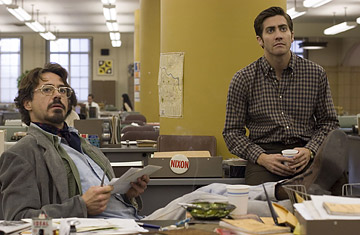
Robert Downey Jr. and Jake Gyllenhaal (left to right) are employees of the San Francisco Chronicle who get tangled up in the clues and symbols left by a serial killer in the thriller Zodiac.
Director: David Fincher; Writer: James Vanderbilt, from the book by Robert Graysmith
With Jake Gyllenhaal, Robert Downey, Jr., Mark Ruffalo, Anthony Edwards, John Carroll Lynch
Paramount Home Video
Available Jan. 8, List Price $34.99
Here's the "two disc special collector's edition" (unspecial collectors bought the one-disc version last July) of a true-crime docudrama about the manhunt for a killer who raised shivers throughout California from 1969 to 1978. He murdered at least five people and maybe many more. Or perhaps other disturbed souls copied his style. Often imitated, never duplicated, Zodiac was the Elvis of serial killers: he had brains, swagger, originality and a flawless sense of p.r. He taunted police and the press with phone calls, coded messages, swatches of his victims' clothes. San Francisco detectives Dave Toschi (Ruffalo) and William Armstrong (Edwards) questioned several suspects, but the killer was never caught.
A Zodiac movie could easily concentrate on Toschi; he was the cop whose holster-carrying style was imitated by Steve McQueen in Bullitt, and who was the model for Clint Eastwood's Harry Callahan; Dirty Harry was an amped-up version of Toschi's Zodiac case. But this film is based on a book by Robert Graysmith (Gyllenhaal). A cartoonist for the San Francisco Chronicle, Graysmith became an amateur sleuth on the case, a real Dick Tracy Crimestopper, and after a decade of research concluded that the murderer was an ex-teacher and ex-con named Arthur Leigh Allen (incarnated with shivering menace and poise by John Carroll Lynch, who, as Gyllenhaal mentions on a commentary track, played his father in Bubble Boy).
A meticulous repiecing of the Zodiac puzzle, the movie could be 90 mins, or four hours, depending on how much of the investigation it chooses to dramatize. This "director's cut" is just eight mins. longer than the 2 hr. 34 min. theatrical release, but it bulges with extras, notably a feature-length doc, This is the Zodiac Speaking, that tracks the murders shown in the film, and a 40 min. sketch, His Name was Arthur Leigh Allen, about the prime suspect. The movie's screenwriter, producer (Brad Fischer) and director also conducted their own investigation, essentially fact-checking Graysmith's narrative, and coming to the same conclusion about Allen. As Vanderbilt says on the commentary, "Dave Toschi told us he looked across the room, he looked at this guy in the eyes and he just felt he was in the presence of evil. And he was felt in his gut that he [Allen] was the guy."
Vanderbilt's research included visiting the crime scenes and interviewing the surviving victims. He recalls having dinner with Bryan Hartnell — "a very nice man" — who was attacked and whose girlfriend was killed by Zodiac. "You know at some point you're going to have to go, 'So when you were tied up, how did you first know he was going to stab you?' It's a really unique experience to take somebody back there to that horrible place and then go, 'But no no no, it's for the greater good. Trust me, we're making a movie. Why wouldn't you want to talk to us?'" And, Hartnell might have asked, who's the director? Umm, the guy who did Se7en, a lurid fictional murder mystery told in true-crime fashion. Gulp.
Whatever Fincher's reputation, Zodiac does not exploit the gruesomeness of the killings or the grief of the victims. In this film, Vanderbilt says, "Deaths are really horrible, and they're not something for you to enjoy, and they're not a little carrot to give the audience for being patient through the talky scenes." The movie is the talky scenes, and the talk is good, drawing the patient viewer into the grim minutiae of the case.
A guest star on the commentary is James Ellroy, the southern California novelist (L.A. Confidential, The Black Dahlia) fresh off a hyper-voltage stint as a guest programmer on Turner Classic Movies. IDing himself here as "king of American crime fiction," Ellroy starts off by proclaiming Zodiac "one of the half-dozen greatest American crime films." A bit later he explains, "What this movie asks you to do is engage rather actively and think, and find nuance, gesture, inflection in investigation that does not lead to the next thing directly." While Vanderbilt stays earthbound, emphasizing the care he and Fincher took adhering to the facts, Ellroy soars into metaphors as bold and high-flown as skywriting, and offers his own thoughts on the Zodiac killer and jurisprudence ("There are systemic inequities in the death penalty system, but motherf---ers like this have to die").
One weirdness on the commentary track: it includes every four-, six-, 10- and 12-letter word known to cops, sailors and rappers, but at the 2 hr. 16 min. mark it actually bleeps the titles of a movie. Huh? That's a new Zodiac mystery that only a Paramount lawyer could unravel.